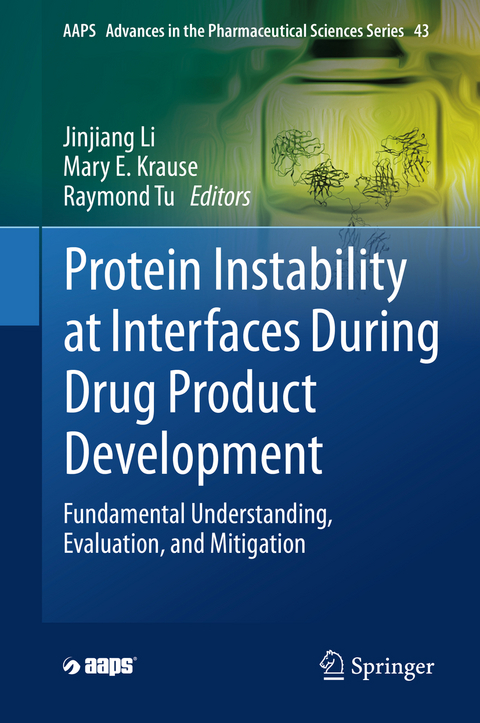
Protein Instability at Interfaces During Drug Product Development
Springer International Publishing (Verlag)
978-3-030-57176-4 (ISBN)
Proteins are exposed to various interfacial stresses during drug product development. They are subjected to air-liquid, liquid-solid, and, sometimes, liquid-liquid interfaces throughout the development cycle-from manufacturing of drug substances to storage and drug delivery. Unlike small molecule drugs, proteins are typically unstable at interfaces where, on adsorption, they often denature and form aggregates, resulting in loss of efficacy and potential immunogenicity. This book covers both the fundamental aspects of proteins at interfaces and the quantification of interfacial behaviors of proteins. Importantly, this book introduces the industrial aspects of protein instabilities at interfaces, including the processes that introduce new interfaces, evaluation of interfacial instabilities, and mitigation strategies. The audience that this book targets encompasses scientists in the pharmaceutical and biotech industry, as well as faculty and students from academia in thesurface science, pharmaceutical, and medicinal chemistry areas.
lt;p>
Dr. Jinjiang Li obtained his M.S. in surface chemistry from the University of Western Ontario, London, Ontario and his Ph.D. in physical chemistry of biomaterials from McGill University, Montreal, Canada, followed by postdoctoral training in pharmaceutics at the School of Pharmacy, University of Wisconsin at Madison. Dr. Li is an expert on drug product development with extensive industrial experience and many publications. He has worked with many major pharmaceutical companies including Boehringer-Ingelheim and Bristol Myers Squibb, involved in the product development of many therapeutic areas. Dr. Li published about 50 articles in a variety of topics, from polymer science and colloids to pharmaceutical drug product development. Currently, his interest centers on the impact of interfacial stress on the development of biologics with focus on the development of drug-device combination product. He is the current chairman of AAPS Protein Purification, Storage, Transportation and Drug-Device Combination community.
Dr. Mary E. Krause works in the Drug Product Development Department of Bristol Myers Squibb in New Brunswick, NJ. She received her M.S. in chemistry from Missouri State University, and her Ph.D. in chemistry from the University of Kansas, with subsequent post-doctoral training in pharmaceutical chemistry at the University of Kansas as a PhRMA Foundation Post-Doctoral Fellow. Her work focused on the characterization of a novel metal binding peptide tag and resulting metal complexes, including novel platinum protein conjugates for use as targeted anti-cancer therapeutics. Dr. Krause's current research interests include formulation and process development of biologic drug products, with emphasis on antibody drug conjugates, metal-catalyzed oxidation, and the effects of process and interfacial stress on long-term stability. She is lead author/co-inventor on multiple publications, patents, conference presentations, and invited lectures.
Professor Raymond Tu is a Chemical Engineering faculty member in the Grove School of Engineering at The City College of New York - CUNY. Dr. Tu received his PhD in chemical engineering from the University of California - Santa Barbara in 2004, studying the design and self-assembly of peptide functionalized molecular architectures. Subsequently, he completed a post-doctoral fellowship in 2005 at Georgia Institute of Technology investigating rheological properties of biologically functionalized polymer-based materials. The current focus of his research program is the synthesis and characterization of surface-active molecular building blocks. The approach his group uses couples classical interfacial tools to examine dynamics with simple transport models to understand the fundamentals of adsorption. This methodology is proving to be an effective tool for understanding biologic drug product development and engineering complex composite materials.
1. Overview of the impact of protein interfacial instability on the development of biologic products .- 2. Protein adsorption at a gas-aqueous interface.- 3. Interfacial behaviors of proteins.- 4. Interfacial stresses during drug substance purification processes.- 5. Evaluation of interfacial stress during drug product development.- 6.Relating interfacial shear and dilatations stress-es to protein aggregation in mAbs.- 7. Analytical techniques for evaluating protein instability at interfaces.- 8. Analysis of aggregates and particles.- 9. Protein interfacial instability of mixing and lyophilization during drug product manufacturing process scale-up and tech transfer.- 10. Excipients: Characterization, purpose, and selection.- 11. Interfacial stress and proteins prepared in the solid state.- 12. Interfaces in protein drug delivery: device concern.- 13. Future perspectives.
| Erscheinungsdatum | 18.12.2020 |
|---|---|
| Reihe/Serie | AAPS Advances in the Pharmaceutical Sciences Series |
| Zusatzinfo | VIII, 338 p. 58 illus., 41 illus. in color. |
| Verlagsort | Cham |
| Sprache | englisch |
| Maße | 155 x 235 mm |
| Gewicht | 688 g |
| Themenwelt | Medizin / Pharmazie ► Medizinische Fachgebiete ► Pharmakologie / Pharmakotherapie |
| Medizin / Pharmazie ► Pharmazie | |
| Naturwissenschaften ► Chemie ► Technische Chemie | |
| Technik | |
| Schlagworte | drug delivery of biologics • drug storage condiditons • protein container compatability • protein interfacial stress • Protein Purification |
| ISBN-10 | 3-030-57176-9 / 3030571769 |
| ISBN-13 | 978-3-030-57176-4 / 9783030571764 |
| Zustand | Neuware |
| Informationen gemäß Produktsicherheitsverordnung (GPSR) | |
| Haben Sie eine Frage zum Produkt? |
aus dem Bereich


